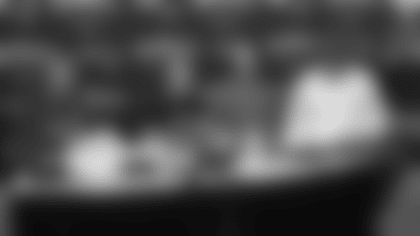IRVING, Texas -- I was intrigued when the boss told me he was sending me to the annual NFL officials clinic.
Face it, few of us know much about the professionals who officiate the games. To help correct that, Mike Pereira, the new director of officiating, offered a reporter access to the long weekend's agenda. I had another reason for wanting to attend. The annual meeting of 119 game officials and 32 replay assistants offered the potential for a career move.
Some time next season -- if history repeats itself -- my name will be bantered about among "insiders"pegging me for an NFL front-office job. That's what happened to the last outsider allowed entry into the NFL officials clinic. Former 49ers linebacker Matt Millen, then an analyst for FOX's NFL coverage, attended the clinic last year in preparation for his George Plimptonesque stint as an umpire during a FOX preseason telecast. Barely six months later, Millen was named president and CEO of the Detroit Lions.
Coincidence? I don't think so.
I'm not sure the clinic transformed me into the leading contender for the next NFL opening -- perhaps because I didn't stay at a Holiday Inn Express -- but it did provide an inside look into how NFL officials prepare for the season. A synopsis:
Friday
Upon arriving at the host hotel adjacent to the Dallas-Fort Worth airport, I have my first encounter with the referees, various judges, and umpires, who look like any other group of conventioneers filling the hotel lobby. Most are wearing sports coats and slacks, even a few ties, but there isn't a striped shirt in the house. It's the first 100-degree day of the year in Dallas, but none of these guys is sweating. I cannot say the same for myself.
Saturday
The assembly of officials has taken on an entirely different look at 7:45 a.m. when 119 officials -- wearing gym shorts, T-shirts, and sneakers -- climb aboard shuttle buses that take them on a short trip to the Dallas Cowboys' Valley Ranch training facility. The first exercise of this year's clinic is a physical assessment of each official.
Each official is weighed and pinched with calipers to measure body fat percentage before preceding to the Cowboys' practice fields and running track, where groups alternate fitness stations that measure agility and flexibility.
Pereira explains that the physical assessment is used to prepare personal fitness plans for the upcoming season, not to eliminate jobs.
The big official in the sky has cut the officials some slack, offering overcast skies and a rare Texas summer breeze that lowers the temperature well below 100 degrees. Officials shuttle from station to station where they are timed in shuttle runs, short sprints, and back-pedals.
A few raindrops refresh the subjects as they complete a timed mile-long walk around the track. The officials' competitive edge shows itself down the backstretch when their walk threatens to break into a run. Heart rates are checked and noted.
Back at the hotel, guests curiously eye the group of sweat-soaked men waiting for elevators. "Did they just run a marathon?"asks a woman who obviously is a non-Texan.
After a shower and a change of clothes, everyone congregates in a hotel ballroom where Pereira and Larry Upson, director of officiating operations, welcome them. Pereira, Upson, and their staff members are former officials familiar with the trials and tribulations that their audience experiences.
"Welcome to a new era,"Pereira says. "It's a new era of 'we.' "
Much of the clinic's focus involves getting feedback from officials as part of Pereira and Upson's desire for better communication among the ranks. Beginning with the preseason, the 119 officials will be scattered across the country, limiting contact mostly to phone calls. Teambuilding for the 2001 season must be accomplished in the next three days.
Pereira introduces me along with several other guests, which produces a unique moment. It's not every day that I'm introduced in the same breath as Troy Aikman. The recently retired Cowboys quarterback and fellow FOX analysts Daryl Johnston and Bill Maas are sitting in on the sessions to learn more about the officials' roles and new rules changes. The former players receive applause. I do not.
Forty-Niners legend Bill Walsh eventually takes the podium. Walsh attends as a member of the NFL Competition Committee, which joined the NFL Players' Association in drawing up tighter restrictions on unsportsmanlike conduct. Walsh praised the officials for their professionalism.
"As far as this group's concerned in pro sports, we can't do any better than this,"Walsh says. "Your expertise, your knowledge, and your commitment are what make the difference."
Walsh admits that he might not have expressed these same sentiments when he was coaching and had calls go against his 49ers, but his respect is sincere.
"NFL officiating is a dynasty,"Walsh continues. "You serve as the conscience of the game. The institution of the game is in your hands."
No pressure there.
During training camps across the country, NFL players will be shown a video explaining the new sportsmanship rules. It addresses the acceptable forms of celebration and communication with opposing players, teams, and spectators. The league is counting on its officials to enforce the new edicts.
Five officials who have completed their tenth seasons are presented service rings. Four rookie officials also are introduced. The new guys, who worked their way up from major college conferences, make quick speeches, but are not forced to sing their alma maters.
Additional sessions detail 2001 rules changes as well as mechanical changes and points of emphasis. Retired officials Jerry Markbreit and Red Cashion have been retained by the league to serve as trainers available for one-on-one tutoring. There's nothing like experience.
The day's agenda ends with crew and position meetings followed by an NFL Referees' Association meeting led by the group's president, Ed Hochuli.
Sunday
The celebrity guests have departed, but Sunday is anything but a day of rest for the NFL officials, who spend a long day grinding through a cerebral marathon.
Their roles on passing plays are detailed before they break into another round of position meetings and crew meetings.
Other than taking an hour for lunch and a 15-minute afternoon break, the officials move from meeting to meeting without seeing the light of day.
Officials also use this time to order their uniforms, bad-weather gear, whistles, and other equipment from the representative of a league-approved provider. You don't just walk into a department store to buy an official's wardrobe.
Additional meetings address special-teams rules and mechanics and instant replay issues. Then comes the dreaded two-hour proctored rules exam. Officials must pass this rules exam to be certified for the upcoming season.
With the big test behind them, attendees get a chance to relax at the NFL Referee's Association dinner, at which the mood is considerably lighter.
Monday
NFL senior director of security Milt Ahlerich calls the officials the least of his department's worries. Ahlerich, an FBI assistant director prior to joining the NFL, would know. He reminds the officials that his department is at their disposal when it comes to doing due diligence on any investments the officials may be considering.
The group is shown a video on the perils of investment scams. The video was produced with NFL players in mind, but it is shown to the officials for its "investor beware"message. ESPN's Stuart Scott gives the booyah-free spiel. Laughter erupts when Scott informs the audience that they've made it to the NFL where they can earn millions of dollars. These men aren't millionaires -- their per-game paychecks range from $1,431 for first-year officials to $4,330 for veterans of 20 seasons -- but are successful in their full-time day jobs. Nobody chuckles when Jaguars running back Fred Taylor relates that a former business associated bilked him out of more than $2 million.
NFL senior vice president of broadcasting Dennis Lewin takes the podium and thanks the officials for their work and cooperation with the league's broadcast partners. Few NFL fans realize how instrumental game officials are in keeping commercial time outs and game stoppages efficient and the length of games manageable. Lewin and his staff inform the officials that a referee cam, similar to last season's successful umpire cam, is in the works.
Pereira and Upson have saved one of the touchiest subjects for the last day of the clinic. The league's evaluation system naturally raises the defense mechanism of most officials, but the league utilizes regular-season grading to maintain quality and to reward the best officials with postseason assignments.
Pereira unveils a revised evaluation system "that is fair and involves officials to a greater degree."
"You are right until we come to a consensus that a wrong call was made," Pereira says. "Grades will not be a surprise."
Seven game reviewers from the league officiating department will grade game films, noting plays and calls that deserve review. The process eventually includes conversations with the referee of that crew and the official who did or did not make the call in question. (For more on the officials evaluation system, please see the Kickoff Issue of NFL Insider, on newsstands in early September.)
Pereira assures the officials that all considerations will be included in their evaluations.
Upson details the revised grade-point system for correct calls, marginal calls, and incorrect calls, causing most in the room to do some quick math. He also announces that 10 percent of each official's season grade will be based on his personal evaluation of aspects such as professionalism.
The room is anxious about the evaluation system. For officials, led by referee Gerald Austin, who worked Super Bowl XXXV, working the postseason not only brings another paycheck -- each Super Bowl official is paid $11,900 -- it is quite an honor.
Upson also announces that the top-rated crew of officials will be assigned to this year's Pro Bowl, giving those who don't qualify for New Orleans a consolation trip to Hawaii.
The officials break into more position meetings and line-of-scrimmage discussions. Then it's time to return home, where they will ready themselves for the preseason that's just around the corner.









































